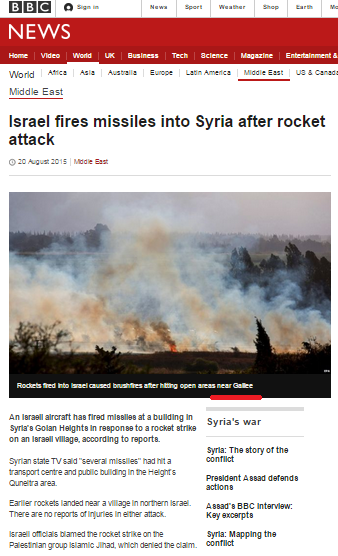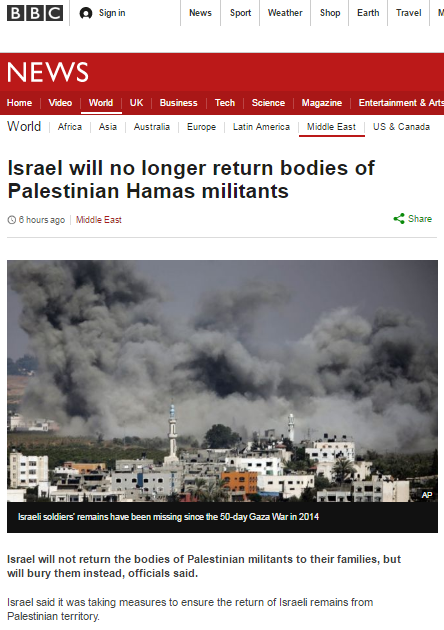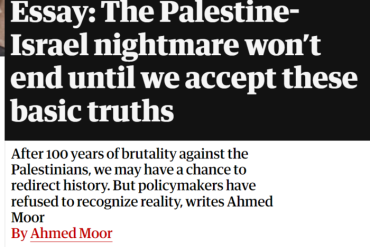At around 5:30 pm on the afternoon of August 20th, four missiles fired from Syria hit areas on the lower flanks of the Golan Heights and in the Galilee Panhandle. Several hours later an article appeared on the BBC News website’s Middle East page with the typical ‘last-first’ reporting style title “Israel fires missiles into Syria after rocket attack“.
Like all BBC News content, that article’s aim was to “[b]uild a global understanding of international issues” and to inform by means of the provision of “reliable and unbiased information of relevance, range and depth” whilst adhering to standards of accuracy and impartiality. But were those criteria met?
The main photograph used to illustrate the report is captioned:
“Rockets fired into Israel caused brushfires after hitting open areas near Galilee” [emphasis added]
Two of the missiles landed in the Upper Galilee district – not “near” it – and we know that the BBC is aware of that because it later quotes an IDF statement.
“A statement released by the Israeli military said the rockets that hit the upper Galilee region….”
The article opens:
“An Israeli aircraft has fired missiles at a building in Syria’s Golan Heights in response to a rocket strike on an Israeli village, according to reports.”
There were four missile strikes – not one as suggested by that phrasing – and the projectiles landed in more than one location. Later on readers are again told that:
“Earlier rockets landed near a village in northern Israel.”
Obviously the main story here is an unprovoked missile attack on civilian targets across an international border. The wider significance of that incident and the effects of the attack on the people it targeted receive no coverage in this BBC report, which devotes almost three times more wording to the topic of the Israeli response than to the missile attack itself.
The bulk of the 318-word article, however, is devoted to the subject of the Palestinian Islamic Jihad’s denial of involvement via a spokesman over 250 kms away in the Gaza Strip.
“Israeli officials blamed the rocket strike on the Palestinian group Islamic Jihad, which denied the claim.
A statement released by the Israeli military said the rockets that hit the upper Galilee region “were launched from the Syrian Golan Heights… by Islamic Jihad, sponsored by Iran”.
The statement went on to say that Israel “holds the Syrian government responsible for attacks emanating from Syria”.
Islamic Jihad had previously threatened reprisals should one of its activists in Israeli detention, Mohammed Allan, die of a hunger strike, but Mr Allan called off his fast on Wednesday after an Israeli court suspended his detention.
Mr Allan is believed to have suffered brain damage after going 65 days without food.” [emphasis added]
The inclusion of the description of Mohammed Allan as “one of its activists” is particularly notable given that the BBC has previously told audiences in two reports (including the link provided) that his affiliation with the terror organization is only “alleged”. The article continues with amplification of PIJ propaganda and a remarkable insinuation:
“Islamic Jihad’s leaders are based in the Syrian capital. Dawoud Shehab, a spokesman for the group who is based in Gaza, denied it had fired on Israel.
“Israel is trying to divert attention from the defeat that it suffered in the face of the determination of the hero prisoner, Mohammed Allan,” Shehab told Reuters.
Islamic Jihad has publicly acknowledged receiving support from Iran, a connection Israel has sought to highlight as it campaigns against the proposed US deal with Iran.” [emphasis added]
In other words, readers are encouraged to view Israeli army statements on this incident as being influenced or dictated by the Israeli government’s stance on the P5+1 (not “US” as stated here) deal with Iran known as the JCPOA.
It is not clarified to readers that the cross-border attack was launched from one of the few areas along the Syrian border with Israel that are still held by the Assad regime – which is of course heavily dependent upon Iran and its proxies at present – and the obviously relevant context of prior Iranian and Iranian-backed activity along that border is absent from this report.
Towards the end of the article readers find more evidence of the BBC’s geographically challenged reporting, tortured phrasing and predictable whitewashing of an internationally recognized terror organization.
“The stretch of border involved in the exchange has been largely quiet since the 2006 war between Israel and the Lebanese guerrilla group Hezbollah.”
A “border” was obviously not “involved in the exchange”: borders do not fire missiles at civilians. Neither is it clear to which border the BBC refers – the Israel-Lebanon border as implied by its reference to the 2006 war or the Israel-Syria border across which these latest missiles were actually fired but where there was no fighting during the 2006 war.
The Oxford Dictionary defines ‘guerilla’ as follows:
“A member of a small independent group taking part in irregular fighting, typically against larger regular forces.”
Hizballah does not confine its activities to attacks on the Israeli military and it is certainly not independent – as evidenced by its Iranian patronage.
The article closes with the following statement:
“Israel captured the western Golan in the 1967 Middle East war and annexed it, a move not recognised internationally.”
The context of why that war began and the obviously relevant history of the pre-1967 Syrian attacks on Israeli villages in the Galilee Panhandle and elsewhere which made it necessary for Israel to take the Golan Heights are not included in that partisan account.
So did readers of this article really get the “reliable and unbiased information of relevance, range and depth” which would enhance their understanding of this incident and its wider implications? Hardly – and as long as the BBC continues to whitewash Iranian backed terrorist organisations and the ideology underpinning them, that will remain the case.




